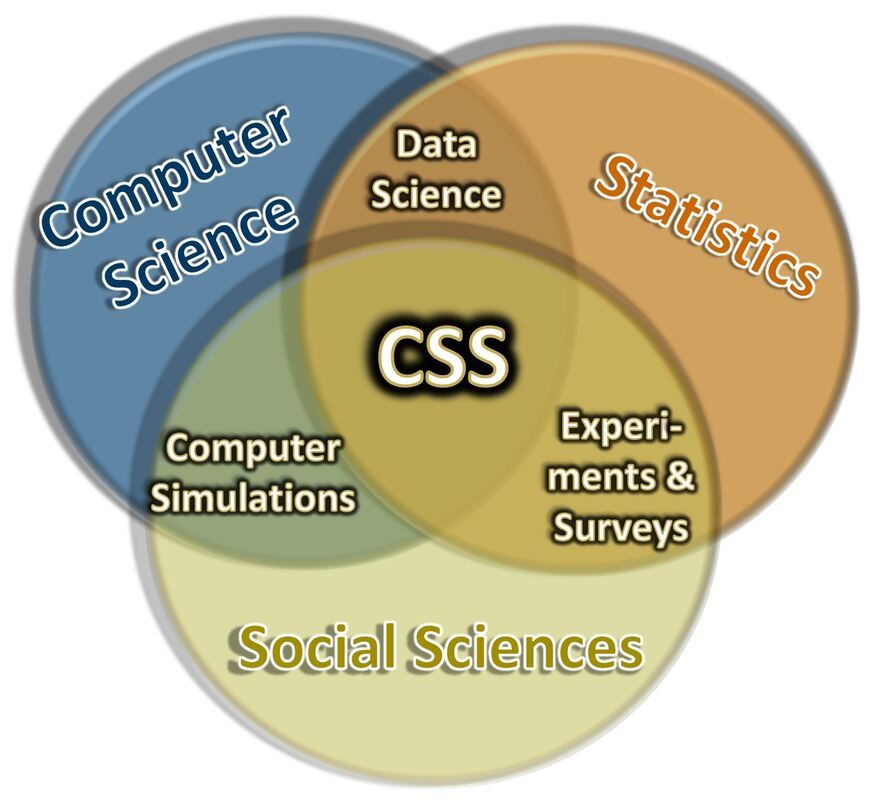About Computational Social ScienceDigital technology has not only revolutionized society but also the way we study it. For one, an increasing part of human interaction leaves a massive digital footprint (aka 'big data'). Studying it allows us to gain unprecedented insights into what society is and how it works, including aspects that had long been evasive, such as intricate social networks and behavioral dynamics through time. Computational methods also provide scholars with new opportunities for surveys, field experiments and new platforms for virtual experiments (aka ‘apps as labs’), which, among other benefits, allow researchers to efficiently scale from the individual to the group level. Additionally, today’s computational power allows us to both detect hidden patterns through artificial intelligence and to simulate social dynamics from the bottom up (aka 'computer simulations'). The latter enables researchers to test for different causal generative mechanisms and to envision and explore hypothetical situations of futures and scenarios that may not exist in empirical reality (yet).
|
A specialization in Computational Social Science, like this Designated Emphasis, is part of a quickly growing field, with its own academic conferences, and allows students with computational and mathematical skills to deepen their understanding of social science theory and it allows students from the social sciences to improve their analytical skills in areas like big data analysis, computer simulations, network analysis and machine learning.
C
|
Digital innovation is the current driver of social change. Among other indicators, this can be seen by the fact that the world's most valuable companies are built on business models that are driven by computational social science approaches. Their solutions drive innovation in all aspects of society, including politics, economics, psychology, sociology, and communication. The resulting changes affect everybody on Earth. Digital transformations have led to unprecedented richness and opportunities, but also to much social uncertainty, fear, and insecurity. Many questions demand answers, including those related to the effects of automation, economic inequality, political power, social discrimination, and cultural norms.
The same digital tools that are changing society also allow us to understand society better. The resulting opportunities are exploited by computational science. This covers both empirical and theoretical methods and research tools. On the one hand, the ever-increasing part of human interaction that takes place in digital networks leaves behind a massive digital footprint. Studying it allows us to gain unprecedented insights into what society is and how it works, including aspects that had long been evasive, such as intricate social networks and behavioral dynamics unfolding over time. Combined with today’s computational power, large datasets make it viable for researchers to detect hidden patterns through machine learning. In fact, much of what nowadays is bundled under artificial intelligence in companies like Amazon, Apple, Google, Microsoft and Facebook, is driven by human and societal data, reaching from language to consumer behavior. As a result, while historically we were used to social studies explaining single-digit percentages of variance, recently, so-called ‘big data’ has made it common to make social predictions at the level of 80-90 % accuracy. On the other hand, today’s computational power also allows researchers to venture into ever more complex theoretical models of society. Computer simulations enable us to explore hypothetical situations that may not even exist in reality, but are useful to understand generative mechanisms and causality. While traditional social models worked with a very limited number of variables (inflation vs. employment, polarization vs. belief, etc.), computer simulations allow researchers to explore the theoretical realm of possibilities more akin to those complex high-dimensional spaces in which society actually operates. In short, computational social science develops and uses computational methods to analyze, model, and simulate social phenomena. |

